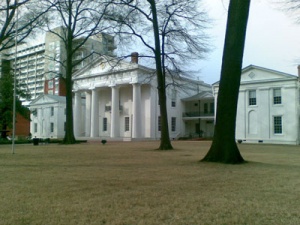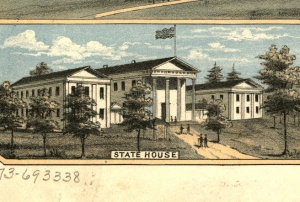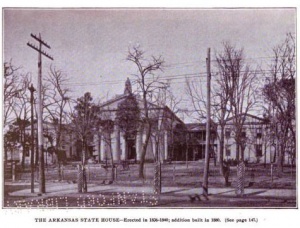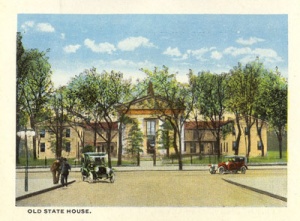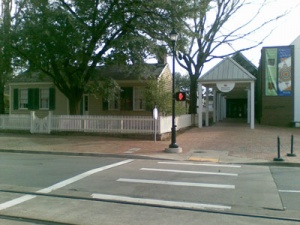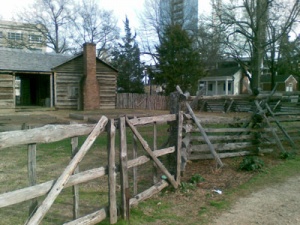Difference between revisions of "Old State House and Historic Arkansas Museum"
(→Old State House) |
|||
| (24 intermediate revisions by 2 users not shown) | |||
| Line 2: | Line 2: | ||
===Old State House=== | ===Old State House=== | ||
| + | [[Image:Old-state-house-1.jpg|thumb|View of the Old State House. Photo by Phil Frana.]] | ||
| + | [[Image:State-house.JPG|thumb|State House in 1871. Drawn & published by A. Ruger. Library of Congress, Geography and Map Division.]] | ||
| + | [[Image:State-house-1890s-pope.jpg|thumb|View of the State House in the 1890s. From Pope's ''Early Days in Arkansas'' (1895).]] | ||
| + | [[Image:Old-state-postcard.jpg|thumb|Postcard view of Old State House.]] | ||
| + | Little Rock's State House is the oldest capitol building west of the Mississippi River that is still in use today. | ||
| − | Little Rock | + | The Arkansas territorial capitol was originally located at Arkansas Post. The seat of government was removed to Little Rock in 1821. The first meeting of the [[Arkansas General Assembly]] took place that same year in a two-room log cabin located in an area circumscribed by Fourth, Fifth, Main, and Scott streets. The General Assembly continued to meet at this site until 1833. |
| − | President Clinton chose the Old State House as a backdrop for his victories because it was his "favorite building in Arkansas." President Clinton loved this building in particular because he believed that the Old State House, "embodies both a reverence for the past and a hope for the future." The Old State House includes an exhibit that complements the [[Clinton Library museum exhibits]], such as a portrait of [[Hillary Clinton]], Bill | + | Architect [[George Weigart]] was hired to design a new State House in 1833. Weigart died the next year and his original plan suffered from reductions due to financial problems. |
| + | |||
| + | The Greek Revival State House opened its doors for the first time in 1836, but remained under construction from March 1833 to 1842. The building is made from handmade bricks. From 1842 until 1911 the Old State House housed both the Arkansas Governor's offices and the State Legislature. (The General Assembly met in Washington, Arkansas, in 1863 when the city of Little Rock was occupied by Union troops.) | ||
| + | |||
| + | In 1947, the Old State House became a museum that features exhibits on Arkansas and Little Rock history: | ||
| + | |||
| + | *Drawing on Arkansas Politics | ||
| + | |||
| + | Featuring political cartoons by Arkansans on Arkansas political themes. | ||
| + | |||
| + | *20th Century Arkansas Politics | ||
| + | *Women's History Exhibit | ||
| + | *Daughters of the American Revolution Period Room | ||
| + | *General Federation of Arkansas Women's Clubs Period Room | ||
| + | *Whistle Stop Station | ||
| + | |||
| + | A hands-on room for kids. The rear end of a caboose is attached to one end of the wall. Children are encouraged to dress-up and make speeches from the caboose. | ||
| + | |||
| + | *Pillars of Power | ||
| + | |||
| + | Documenting the construction and past renovations of the Old State House. | ||
| + | |||
| + | *1836 House of Representatives Chamber | ||
| + | *1885 House of Representatives Chamber | ||
| + | *Sparkle & Twang Galleries | ||
| + | *First Families of Arkansas | ||
| + | *First Ladies Gowns | ||
| + | *United Daughters of the Confederacy Period Room | ||
| + | *Arkansas Pioneer Association Period Room | ||
| + | |||
| + | The 8-inch iron-banded cannon on the front lawn is nicknamed "Lady Baxter." It was used to defend Little Rock during the Union attack on Little Rock in the summer of 1863. | ||
| + | |||
| + | The museum is managed by the [[Department of Arkansas Heritage]], and is listed on the National Register of Historic Places. | ||
| + | |||
| + | President [[Bill Clinton]] contributed to the transformation and recent elevated profile of the Old State House. The museum was the setting for many of President Clinton's political highlights throughout his career. For instance, Bill Clinton declared his candidacy for the 1992 presidential election here on October 3, 1991. Then in both 1992 and 1996 Bill Clinton celebrated both presidential election victories at the Old State House Museum. President Clinton chose the Old State House as a backdrop for his victories because it was his "favorite building in Arkansas." President Clinton loved this building in particular because he believed that the Old State House, "embodies both a reverence for the past and a hope for the future." The Old State House includes an exhibit that complements the [[Clinton Library museum exhibits]], such as a portrait of [[Hillary Clinton]], Bill Clinton's saxophone, and some of Bill Clinton's [[campaign buttons]] for gubernatorial and presidential elections. | ||
===Historic Arkansas Museum=== | ===Historic Arkansas Museum=== | ||
| − | The Historic Arkansas Museum is home to artifacts, art, and products that highlight Arkansas' heritage and culture. The museum features costumed "living history" guides | + | [[Image:Historic-arkansas-1.jpg|thumb|Entrance to the Historic Arkansas Museum in Little Rock. Photo by Phil Frana.]] |
| + | [[Image:Historic-arkansas-2.jpg|thumb|The Log House Education Center at the Historic Arkansas Museum. Photo by Phil Frana.]] | ||
| + | Historic Arkansas Museum is a state history museum located in downtown Little Rock, Arkansas. The Historic Arkansas Museum is home to artifacts, art, and products that highlight Arkansas' heritage and culture. Artifacts and contemporary art are displayed in the Trinity Gallery for Arkansas Artists, Second Floor Gallery, Horace C. Cabe Gallery, Gallery II, Knife Gallery, and Study Gallery. | ||
| + | |||
| + | The museum has hands-on exhibits for children in the [[Sturgis Children's Gallery]]. The Sturgis Gallery features a magnetic sand table where children can uncover old iron nails and other artifacts, a puppet theater and video monitor, a game called "Arkansas Twister," a dress-up daguerreotype studio, and a choose-your-own-adventure style computer game "Escape to Freedom." | ||
| + | |||
| + | One of the museum's goals is to demonstrate to visitors how early residents of Arkansas would have lived during frontier times. The museum has assembled a pre-Civil War neighborhood, including the [[Hinderliter Grog Shop]], the [[Brownlee House]], [[McVicar House]], and [[Plum Bayou Log House]]. The museum also occasionally features costumed "living history" guides. | ||
| + | |||
| + | From September 2 until October 31, 2004, the museum hosted the exhibit [[Construction Site: Clinton Presidential Center]]. This exhibit was featured in the Trinity Gallery. The photographs featured were of construction of the center beginning in January of 2003 by [[Timothy Hursley]]. | ||
| + | |||
| + | The Historic Arkansas Museum is managed by the [[Department of Arkansas Heritage]]. The Historic Arkansas Museum was formerly known as the [[Arkansas Territorial Restoration]]. The site is formerly the location where [[William E. Woodruff]] printed the [[Arkansas Gazette]]. | ||
| + | |||
| + | The museum is open from 9 AM to 5 PM on Monday through Saturday, and from 1 PM to 5 PM on Sunday. Admission is free. Tours of the grounds and outbuildings are $1 for children 18 and under, $2.50 for adults, and $1.50 for senior citizens. | ||
==References== | ==References== | ||
| + | |||
| + | *Myra McAlmont Vaughan, "A History of the Old State House," in ''Publications of the Arkansas Historical Association'' vol. 3 (Fayetteville, AR: Arkansas Historical Association, 1911), 249-255. | ||
==External links== | ==External links== | ||
Latest revision as of 10:40, 15 May 2009
The Old State House and Historic Arkansas Museum is a national historic landmark located at 300 West Markham Street and 200 East 3rd Street in downtown Little Rock, Arkansas.
Old State House
Little Rock's State House is the oldest capitol building west of the Mississippi River that is still in use today.
The Arkansas territorial capitol was originally located at Arkansas Post. The seat of government was removed to Little Rock in 1821. The first meeting of the Arkansas General Assembly took place that same year in a two-room log cabin located in an area circumscribed by Fourth, Fifth, Main, and Scott streets. The General Assembly continued to meet at this site until 1833.
Architect George Weigart was hired to design a new State House in 1833. Weigart died the next year and his original plan suffered from reductions due to financial problems.
The Greek Revival State House opened its doors for the first time in 1836, but remained under construction from March 1833 to 1842. The building is made from handmade bricks. From 1842 until 1911 the Old State House housed both the Arkansas Governor's offices and the State Legislature. (The General Assembly met in Washington, Arkansas, in 1863 when the city of Little Rock was occupied by Union troops.)
In 1947, the Old State House became a museum that features exhibits on Arkansas and Little Rock history:
- Drawing on Arkansas Politics
Featuring political cartoons by Arkansans on Arkansas political themes.
- 20th Century Arkansas Politics
- Women's History Exhibit
- Daughters of the American Revolution Period Room
- General Federation of Arkansas Women's Clubs Period Room
- Whistle Stop Station
A hands-on room for kids. The rear end of a caboose is attached to one end of the wall. Children are encouraged to dress-up and make speeches from the caboose.
- Pillars of Power
Documenting the construction and past renovations of the Old State House.
- 1836 House of Representatives Chamber
- 1885 House of Representatives Chamber
- Sparkle & Twang Galleries
- First Families of Arkansas
- First Ladies Gowns
- United Daughters of the Confederacy Period Room
- Arkansas Pioneer Association Period Room
The 8-inch iron-banded cannon on the front lawn is nicknamed "Lady Baxter." It was used to defend Little Rock during the Union attack on Little Rock in the summer of 1863.
The museum is managed by the Department of Arkansas Heritage, and is listed on the National Register of Historic Places.
President Bill Clinton contributed to the transformation and recent elevated profile of the Old State House. The museum was the setting for many of President Clinton's political highlights throughout his career. For instance, Bill Clinton declared his candidacy for the 1992 presidential election here on October 3, 1991. Then in both 1992 and 1996 Bill Clinton celebrated both presidential election victories at the Old State House Museum. President Clinton chose the Old State House as a backdrop for his victories because it was his "favorite building in Arkansas." President Clinton loved this building in particular because he believed that the Old State House, "embodies both a reverence for the past and a hope for the future." The Old State House includes an exhibit that complements the Clinton Library museum exhibits, such as a portrait of Hillary Clinton, Bill Clinton's saxophone, and some of Bill Clinton's campaign buttons for gubernatorial and presidential elections.
Historic Arkansas Museum
Historic Arkansas Museum is a state history museum located in downtown Little Rock, Arkansas. The Historic Arkansas Museum is home to artifacts, art, and products that highlight Arkansas' heritage and culture. Artifacts and contemporary art are displayed in the Trinity Gallery for Arkansas Artists, Second Floor Gallery, Horace C. Cabe Gallery, Gallery II, Knife Gallery, and Study Gallery.
The museum has hands-on exhibits for children in the Sturgis Children's Gallery. The Sturgis Gallery features a magnetic sand table where children can uncover old iron nails and other artifacts, a puppet theater and video monitor, a game called "Arkansas Twister," a dress-up daguerreotype studio, and a choose-your-own-adventure style computer game "Escape to Freedom."
One of the museum's goals is to demonstrate to visitors how early residents of Arkansas would have lived during frontier times. The museum has assembled a pre-Civil War neighborhood, including the Hinderliter Grog Shop, the Brownlee House, McVicar House, and Plum Bayou Log House. The museum also occasionally features costumed "living history" guides.
From September 2 until October 31, 2004, the museum hosted the exhibit Construction Site: Clinton Presidential Center. This exhibit was featured in the Trinity Gallery. The photographs featured were of construction of the center beginning in January of 2003 by Timothy Hursley.
The Historic Arkansas Museum is managed by the Department of Arkansas Heritage. The Historic Arkansas Museum was formerly known as the Arkansas Territorial Restoration. The site is formerly the location where William E. Woodruff printed the Arkansas Gazette.
The museum is open from 9 AM to 5 PM on Monday through Saturday, and from 1 PM to 5 PM on Sunday. Admission is free. Tours of the grounds and outbuildings are $1 for children 18 and under, $2.50 for adults, and $1.50 for senior citizens.
References
- Myra McAlmont Vaughan, "A History of the Old State House," in Publications of the Arkansas Historical Association vol. 3 (Fayetteville, AR: Arkansas Historical Association, 1911), 249-255.
